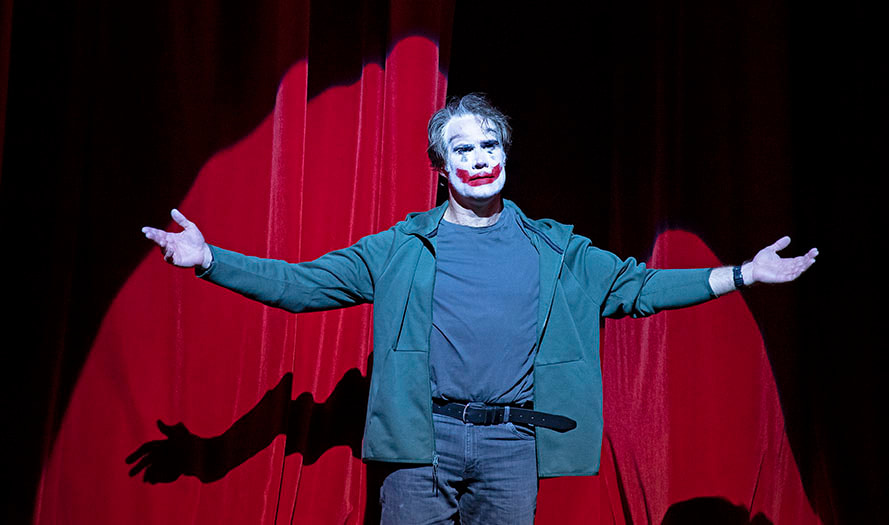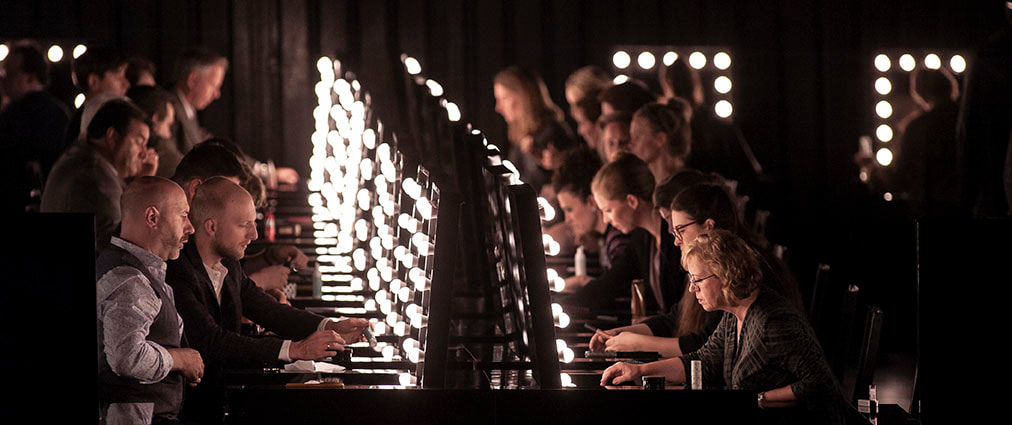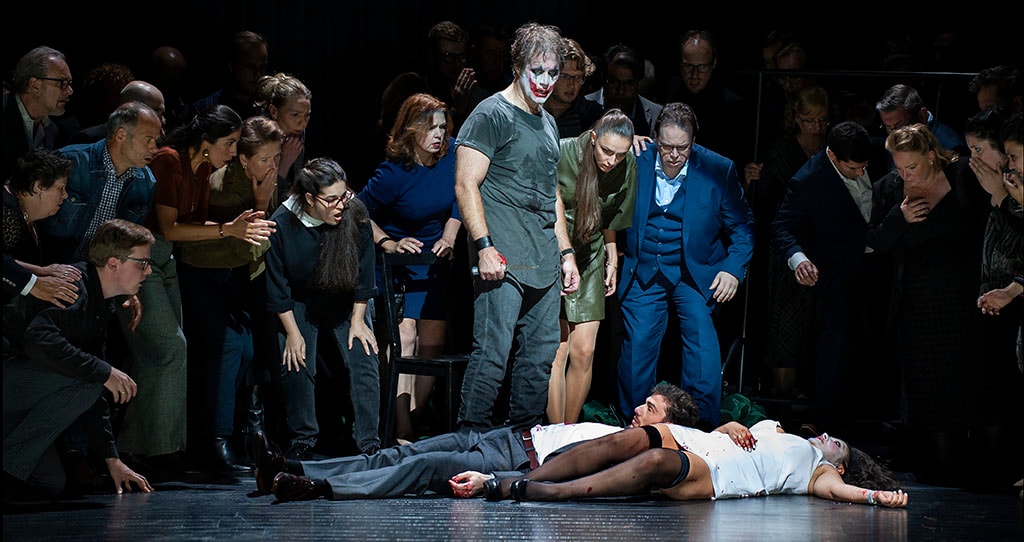The Dutch National Opera opens the 2019/2020 season with Pagliacci / Cavalleria Rusticana. In this Italian double hit, Robert Carsen plays an ingenious game with reality. From a season that brings us a reprise of the Pierre Audi Walküre and shares with us Katie Mitchell's vision on Richard Strauss' Frau Ohne Schatten, the double bill Pagliacci / Cavalleria Rusticana was a convincing kick-off. An opera season in which the Dutch National Opera in addition to its (usual) Teutonic repertoire offers more room for Italian opera (Rossini's La Cenerentola and Verdi's Nabucco are on the programme and also blockbuster Carmen should in context of serving different tastes, attracting a possible wider audience, not go unmentioned). It was a start of the season in which we also met the new chief conductor who after this season (Marc Albrecht has his last year with DNO) will make his appearance in the Amsterdam opera house. With the young Lorenzo Viotti (he is only 30 years old), the Dutch National Opera has brought in new talent. A conductor who, with his early debut for DNO (prospective conductor Mark Elder had to cancel due to health reasons), immediately left an unforgettable impression. After Ingo Metzmacher, an advocate of 20th-century opera, and Marc Albrecht, a specialist in scorching (late-) romantic repertoire, the Dutch National Opera is recruiting with Viotto a conductor who has hitherto mainly 19th-century Italian repertoire under his belt. In addition to his first performance for DNO, received with reviews written in accolades, let's hope that Viotto's preferences will not lead to an overly conservative choice of programme and that his traverses in German and more modern repertoire will lead to just as much success as his triumphal march along this Leoncavallo / Mascagni double bill. More than just a hot-blooded sermon on human lust and love, the jealousy and violence-fuelled intrigue in (somewhat) stereotypical Italian drama was neatly parked between a fine piece of Regietheater and a more traditional storytelling method. A production that was not only suitable for those for whom Italian opera is synonymous with a genre. Also for those who are generally more concerned with the Germanic branch of the opera family (yours truly) was the adaptation by Robert Carsen (previously responsible for Dialogues des Carmelites at DNO) of Pagliacci / Cavalleria Rusticana worth its price for admission. He played a game with the perception of the audience and directed in this way not only the emotion but also made an explicit appeal to the mind. In Pagliacci it is not entirely clear to what extent protagonist Canio can distinguish reality from performance, and Carsen makes this diffuse boundary between reality and theatre the starting point of his production. He changed the usual order of the two operas, making Pagliacci a piece that was performed in the theatre where the cast of Cavalleria Rusticana was preparing to sing in an Easter Mass. This choice helped Cavalleria to become the somewhat surprising musical winner of the evening. Pagliacci, sparkling and grim, was the support act for a sultry high mass in Cavalleria in which a tapestry of heavenly close-harmony singing was unfolded. An exercise in choral singing led by Ching-Lien Wu, who played herself, in which the choir turned from their usual role as spectator and commentator into a protagonist and excelled - perhaps even more than it usually does in productions for DNO. Not only in Cavalleria but also in Pagliacci was the choir more than just a bystander and became thus the real leading star of this production. It sat on the first three rows in the hall, as part of the audience. In what seems to be a trend, circus people who don't want to limit themselves to the dimensions of a stage (Tannhauser in Bayreuth last summer), the members of the choir were spectators and participants in one. They acted, reacted, applauded, exhorted to silence and played with the conventions of (Italian) opera with its (pre-programmed) applause after an aria. It worked like a two stage missile. Pagliacci became - with an excellent Brandon Jovanovich in the role of Canio - a first highlight that just after the intermission only seemed to be the prelude for Cavalleria Rusticana. Canio and the people he killed, Nedda and Tonio, turned out to be just actors. The murders before the intermission were just part of a piece of theatre-in-a-theatre. It made Pagliacci a kind of support act - a role that Cavalleria Rusticana usually plays when these two operas are paired - which did not mean that what was presented to us in Pagliacci was stripped of its emotional gravity. Pagliacci presented as a performance-in-a-performance did not diminish the involvement of the viewer any less as the credits of a movie do when we, the audience, are reminded that the personages we saw were only actors. Of these singer-actors, Brandon Jonovich as Canio gave a grim, intense performance that in the aria Ridi Pagliacci found a (expected) highlight that at times looked like a trailer for the upcoming Joker movie. In the theatre show that Carsen built, there was room not only for strong acting, but also for old-fashioned Italian singer drama. With a classical feeling for grand gestures in voice (and behaviour, a tweet during the rehearsals in which she complained about the fact that DNO did not allow her to take her dog inside the theater suggested such a thing) Anita Rachvelishvili sang the role of Santuzza. An interpretation for the lover of glowing, powerful opera singing. A voice, full in all registers, that captured all (extreme) aspects of the drama. As if Renate Tibaldi and Maria Callas fought their classic battle between beauty and expression and found in Rachvelishvili's performance a rutted, tantalising amalgam. In a roller coaster of emotions, Rachvelishvili brought Santuzzi to life. The woman Tiruddi rejects because he is in love with Lola, Alfio's wife, and, in this production, has been banned from the choir. As Santuzzi, Rachvelishvili, confined with a tormented heart, gave shape to a warm-blooded angel of revenge. She tells Alfio about his wife's affair and thus initiates the duel in which Alfio kills Tiruddi. The extent to which this death is 'reality' or merely theatre-in-a-theatre ultimately remains - when we see ourselves in a mirror on stage at the very end (when the curtain has fallen) - a question with an open answer. Carsen peels off the layers of theatre reality and leaves the final answer to the question of what is real or not to the audience. Of how far a theatre-maker can stretch an idea until it deprives the spectator of its illusion is up to everyone individually to determine. This Pagliacci / Cavalleria Rusticana goes meta, appeals to the mind so that the emotion lingers longer. At the Dutch National Opera it may have been since Simon McBurney's staging of Raskatov's A Dog's Heart that a production gave such added value to text and music. One can only hope that the rest of the new opera productions this season will have something of the originality and inventiveness of this one. It was about the dynamics of theater and not about the grandeur of visuals. With my only reference in this matter, the museal opera film that Franco Zeffirelli once made of this diptych, my expectations were somewhat reserved but that a theaterical layer could be of such additional benefit to classic verismo-repertoire came as more than just a pleasant surprise. Dutch National Opera (18 September 2019) Dates 5 Sept t/m 28 Sept Conductor: Lorenzo Viotti Nederlands Philharmonisch Orkest Choir Dutch National Opera Chorus master: Ching-Lien Wu PAGLIACCI Prologue: Roman Burdenko Nedda: Ailyn Pérez Canio: Brandon Jovanovich Tonio: Roman Burdenko CAVALLERIA RUSTICANA Santuzza: Anita Rachvelishvili Lola: Rihab Chaieb Turiddu: Brian Jagde Alfio: Roman Burdenko - Wouter de Moor
0 Comments
|
TIMELINE
July 2024
|





 RSS Feed
RSS Feed